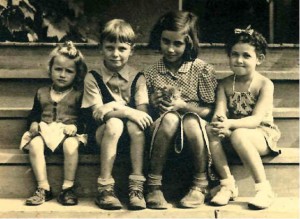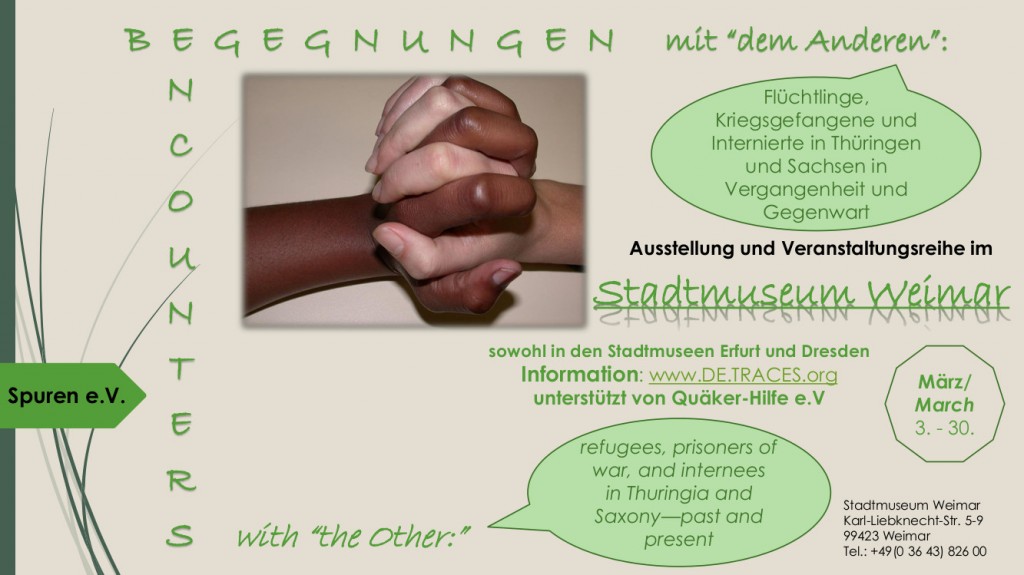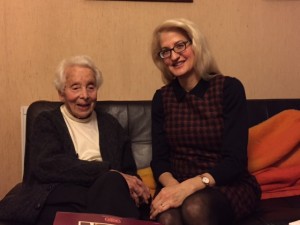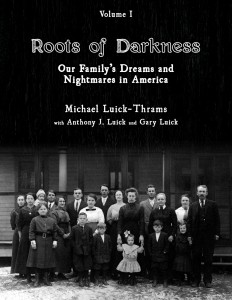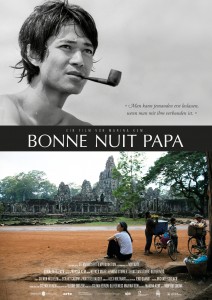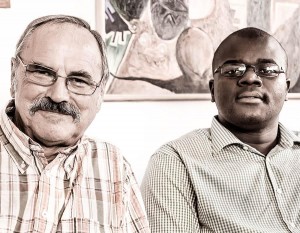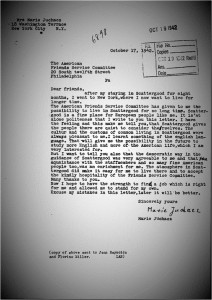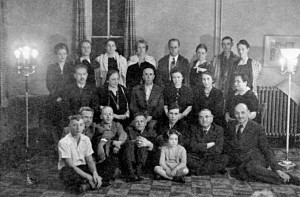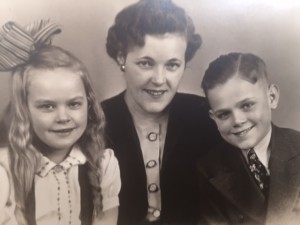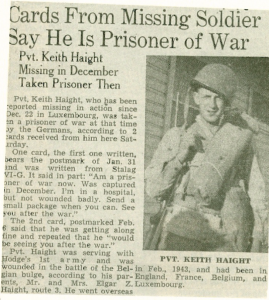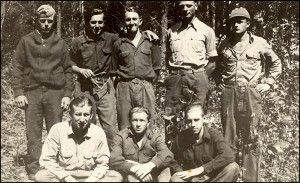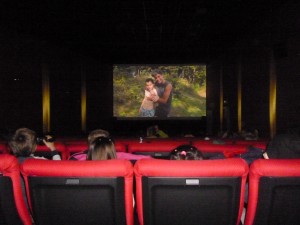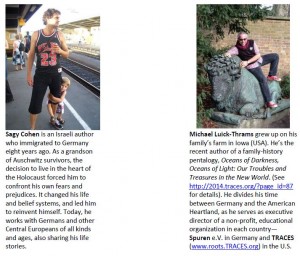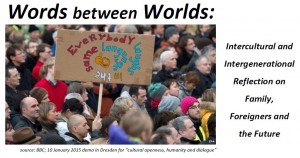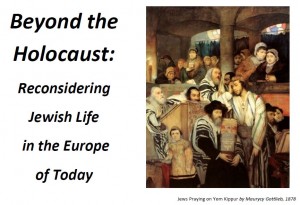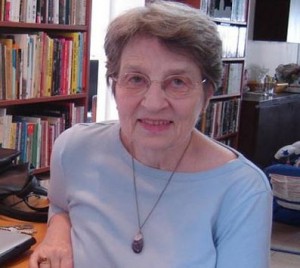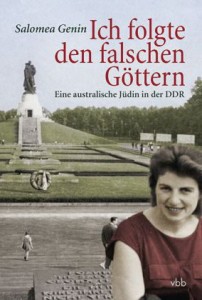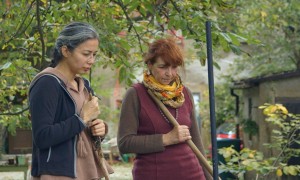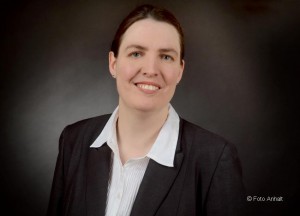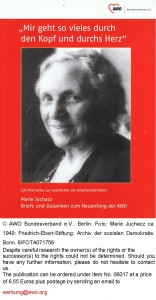If not marked otherwise, all programs take place at the Stadtmuseum Weimar:
Karl-Liebknecht-Straße 5, 99423 Weimar; 03643.82600; www.stadtmuseum.weimar.de
MDR-Radio interview (in German) with Michael
Luick-Thrams on 4 March 2016 about this project:
Thursday, 3.3.2016, 17:00 (ex., 5PM)
exhibit opening
greeting: Dr. Alf Rössner (Stadtmuseum Weimar); Dr. Michael Luick-Thrams (Spuren e.V.)
introductory lecture: Prof. Dr. Jörg Seiler (Universität Erfurt): Who is “The Other?”: Historical Queries in the Context of Wartime Experiences
Friday, 4.3.2016, 17:00-18:30
“Suddenly, I was a Jew!” So-called “Non-Aryans” and other “Undesirables” during the Nazi Era
The Nazis abused Socialists and other political opponents already in the early 1930s. Soon, however, the majority of the persecuted were so-called “non-Aryans.” Many of them were non-practicing Jews, who did not even identify with their Jewish identity. Dr. Lucinda Martin (Forschungszentrum [„Research Center”] Gotha/Universität Erfurt) is leading a study of the rolls Quakers played in the rescue of thousands of “others.” In her presentation, she will show film excerpts from her interviews with these “non-Aryans,” in which eye-witnesses speak from their own memories. Those in the public who have stories of their own from that period are invited to participate in the subsequent discussion.
Dr. Lucinda Martin during an interview with Daisy Hoffner, one of the
thousands of Jewish refugees rescued by Quakers during the Nazi period.
Saturday, 5.3.2016, 11:00-13:30 (free, but pre-registration is requested, under: staff@TRACES.org) in the STADTMUSEUM ERFURT: Johannesstraße 169, 99084 Erfurt; 0361.6555659
Workshop: “Family History a Bit Different:” Social Contexts behind One’s Genealogy
Using his family-history research, Dr. Michael Luick-Thrams will feature ways that one might perceive, understand and preserve her or his own family history anew. This workshop is based on his E- and paper-printed book, Roots of Darkness: Our Family’s Dreams and Nightmares in America.
Saturday, 5.3.2016, 18:00-20:30 in STADTMUSEUM WEIMAR
the showing of Bonne Nuit Papa [“Good Night, Papa”] (trailer in English)
The film will be accompanied by Monika Bethmann, whose daughter is the film’s director and one of its protagonists. She will speak about her life with an Asian foreigner in the German Democratic Republic (GDR), followed by an audience discussion. For further info see: www.sterntaucher-filmproduktion.de.
Sunday, 6.3.2016, 13:30-14:30
Refugees after World War II in Thuringia
Dr. Torsten Müller (Eichsfelder Heimatmuseum [“Local Museum”] Bad Heiligenstadt) will speak about the integration of refugees in Thuringia after WWII, with a view to the religious-integration process.
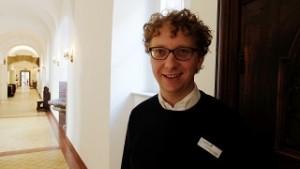
Torsten Müller, director of the Eichsfelder Heimatmuseum (MDR photo)
Sunday, 6.3.2016, 15:00-17:00
Presentation and audience discussion: “At Home—but Really?” Foreigners in the GDR
“Guestworkers” as well as foreign students lived in the GDR: We wish to learn about their biographies and come into conversation with them to talk about the issues that affected them, then and still today. The main speaker will be Piedoso Manave, a Mozambican who lived in the GDR and stayed. In addition, we will view and discuss two short films that explore how “bi-cultural” Africans live “between worlds.” For more information click here.
German father with son born in Mozambique, in short film about bi-cultural Mozambicans
about the short documentary (photo above): Eckehard Fricke, deputy director of GIZ (German Society for International Cooperation), has adopted two Mozambican children who are now studying in Europe. Near retirement, he lives with a Mozambican woman in a house he built himself on the outskirts of the city. In the film, he and his dark-skinned son (who considers himself “90% German”) talk in the church’s office about the way his time in Mozambique has influenced and changed him and how German he still feels after all these years. We see him at a Sunday church service: The church is empty, but Eckehard and the pastor still hold a traditional German service, complete with organ music from a laptop.
Sunday, 6.3.2016, 17:00-18:30
“Settlers and Scarecrows”: Winners become Victims
In the 1920s, Dr. Michael Luick-Thrams’ great-grandfather, George Michael Luick, was a member of the Ku-Klux-Klan in Iowa, which only came to light recently. How can one deal with such a dark chapter of one’s family history? What does it mean for those who follow?
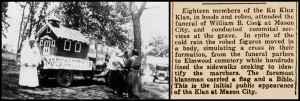
Postville (Iowa) Herald article of 10 April 1924 about Klan rally George Michael Luick attended
Monday, 7.3.2016, 18:00-20:00
“Safe Haven on the Prairie:” Refugees in Iowa, 1939-43
During the Nazi period Iowa farmers and students took in 185 refugees—Jews, but also politicians and other persons, including from Dresden, Leipzig and the Chemnitz region of western Saxony. Why did they do that? Dr. Michael Luick-Thrams will review the Quaker-run “Scattergood Hostel” (11-minute film) and ask, if this might serve as a model today.
A short lecture will follow about Marie Juchacz:
Lydia Struck M.A., cultural scientist and author, about Marie Juchacz’ Letters from Scattergood Hostel
At age 62, SPD politician and founder of the Arbeiterwohlfahrt (AWO; „Workers’ Welfare”) Marie Juchacz found a safe haven at Scattergood Hostel. What influences did help from the Quakers have on her life, the founding of the „Arbeiterwohlfahrt New York”, the sending of „Care Packages” and the new founding of the AWO in Germany?
Witness Günter “George” Krauthamer (sitting on the floor, lower left in the above photo of Scattergood Hostel staff [back row] and refugee “guests”; Marie Juchacz sits second from left, middle row) will speak (via Skype) about his encounters with Marie Juchacz in the USA. His mother came from Chemnitz and was a Lutheran; his father was a Polish Jew.
Tuesday, 8.3.2016, 18:00-20:00
“The ‘Dream’ turns into a ‘Nightmare’:” Internees in the USA, 1941-48
During the Second World War, the US government interned some 15,000 German-descended men, women and (a few thousand) children in about 60 camps. Many were “repatriated” to the “Third Reich”—in part in exchange for Nazi-held US-Americans. Among the deported were also Jews and German refugees. Michael Luick-Thrams asks how could that happen? Excerpts from a short film give clues: http://www.traces.org/programs-link-contents/CC-camp.html.
caption written by Anneliese: “Xmas 1942 family pic we sent to Pappi
while he was in internment camp” near Bismarck, North Dakota; the
photo shows Anneliese, mother Alma (nee Wiedrich) and brother Freddy
Anneliese Krauter (nee’ Wiegand; born in 1935 in New York) was interned by the US government with her German parents in Camp Crystal City (Texas) and later „repatriated” to the „Third Reich”, where her father was drafted into the administration of an Allied prisoner-of-war (POW) camp in Thuringia, where he functioned as a translator. Since the 1950s, she lives again in the USA (Indiana). She has written a book about her exceptional family history and will speak about that book as well as her life experiences.
Wednesday, 9.3.2016, 18:00-19:30
“You among Us:” Midwest Prisoners of War in German Camps, 1943-45
About 95,000 US-American prisoners of war landed in the hands of the German Wehrmacht during WWII—many of them from the American Midwest, especially Iowa. Their encounters with German guards, farmers and the general population had its dark sides, but also courage and humanity. Dr. Michael Luick-Thrams will read from their diaries.
likely Globe-Gazette article, printed in early 1945, based on dates cited in it; When Keith Haight died in October 2001, his widow, Marguerite (Ver Helst) Haight, wrote: Keith enlisted in the army in 1943, leaving for England after basic training and six weeks of desert training. His entry into WWII was landing on Normandy on D-Day plus one. After jumping off the landing craft with a 90-pound pack on his back, he immediately sank to the bottom. Thanks to a good buddy who pulled him up and drug him along, he managed to make it to shore. Keith went on to front-line action in France, Belgium and Luxembourg, then to the Battle of the Bulge, where the U.S. forces had penetrated far into enemy territory. They were overwhelmed by the Germans after running out of ammunition. He was bayoneted and left for dead. After the enemy left, he managed to crawl to a barn nearby. Being an Iowa farm boy, he was able to live on milk and oats for two days. After making an attempt to escape, he was captured by the Germans. By this time, his wound was infected and, for some reason he could never figure out, they put him in a German ambulance and took him to a nearby field hospital. Thanks to a Catholic nun who intervened on his behalf, they agreed to operate. Having no anesthetic even for their own men, two men sat on him, one on his feet and one on his head, while the doctor did the surgery. Just a few days later, they put him in a boxcar and sent him on this way. He and other prisoners were jammed into a cattle car with no food or water, only one thin blanket each, and wooden shoes. He was first taken to Stalag G-6 and later to Stalag 4-B in Poland, which was a work camp. Each day, Keith was made to walk to the mines two miles away, digging what, he never knew. The wooden shoes didn’t offer much protection, so he ended up with frozen feet and hands. They received only one bowl of thin soup each day and soon learned to relish the weevils floating on the top. Some days they would also get a loaf of bread made mostly of sawdust to be divided twelve ways. One day a rumor circulated that the Red Cross was coming to visit the camp and, much to their surprise, they were all issued warm new blankets that were taken away as soon as the Red Cross left. Beatings were a common event each day. When ex-POWs were asked what they thought of most, they all replied, “enough food to stay alive.” As the war was drawing to a close, Keith was liberated by the Russians and traveled with them until they reached the American lines. He was then sent to Camp Lucky Strike and back home. On board ship, on the way home, he hung around the kitchen, eating fruit cocktail and sweetened condensed milk. His weight went from 115 to 154 pounds by the time he reached home. Back home, Keith was put on leave, then, ironically, sent to Colorado to guard German prisoners [of war held in the United States]! Thursday, 10.3.2016, 18:00-19:30 “We among You:” German POWs in the Midwest, 1943-46 During WWII more than 380,000 German POWs were interned in US camps—some 20,000 in Iowa, alone. In postwar East Germany soldiers speaking about their return was taboo. Dr. Michael Luick-Thrams explains why the connections between German POWs and their „hosts” are the sources of legends, to the present day. German Prisoners of War at a Camp Algona (Iowa) branch camp in Minnesota, circa 1944 Friday, 11.3.2016, 18:00-20:00 “Wurzeln-Wege-Wünsche” [“Roots-Paths-Wishes”]: A Film about and with Refugee Kids At the center of this short-film documentary are refugee children and youth from the “Übergangsklasse” [„transitional class”] of the Mittelschule Weidenberg. They talk about from where they come, what their trek to Germany was like, what their life is like now and what they wish for their future. We will view the film and speak about it with the director, who makes tangible a timely and complex topic. An Israeli author, Sagy Cohen has lived in Bayreuth since 2007. As an “integration trainer,” Sagy is active in the educational work related to topics such as “tolerance,” “Jewish life” and refugee assistance. refugee children watching film about and made by refugee children, led by Sagy Cohen Saturday, 12.3.2016, 10:00-12:00 (free, but pre-registration is requested, under: staff@TRACES.org) Workshop, Part I: “Words between Worlds”: Encounters and Exchange between Germans and Non-Germans This workshop seeks to facilitate intercultural and inter-religious competence through dialog. First, the facilitators will present about their families of origin and the cultures of their native countries. Based on that, the large group will then reflect on cultural differences and conditioning. What is allowed in this process—and what is taboo? What do we wish for our lives and for our chosen homeland in the future? Presenters are: Sagy Cohen (born 1977 in Tel Aviv, Israel), Miriam Taani (1978; Amman, Jordan) und Michael Luick-Thrams (1962; Mason City, Iowa/USA) Saturday, 12.3.2016, 14:00-17:00 (free, but pre-registration is requested, under: staff@TRACES.org) Workshop, Part II: “Words between Worlds: We Create Encounters and Exchange between Strangers” A continuation of the morning’s conversation, this segment will be facilitated by mediator Björn Rohde-Liebenau and Haitham Khalaf of Syrian, who have been living in a community of 18 Germans and Syrians since March 2015. Sharing some of their lives, they seek to help each other make sense of a changing world and their native countries. For that to happen, they need safety and identity, a sense of belonging together and respect. This is a conversation “between worlds” with the goal that all will be heard. Saturday, 12.3.2016, 18:00-19:30 “Them among Us:” Jews and Muslims in the Germanic Realm Lecture: “Germany’s Refugee History, from the Near-East to the Near-East” “Refugee crisis:” Is the past repeating itself? Already since about 800 C.E, refugees came to the German realm whose origins were in the Near-East—Jews. They arrived with other languages, other customs and another religion. We all know how that story ended: What have we learned from all that? In his lecture Sagy Cohen combines questions of the present with experiences from the past. Sunday, 13.3 2016, as of 11:00 following the Weimar Friends meeting (by invitation) Workshop, Part I: “Always ‘The Other’—No Matter Where:” The Life of a Refugee Salomea Genin (born in 1932 in Berlin) fled the Nazis in May Mai 1939 with her Jewish family to Australia. In 1944 she joined the Communist Youth and in 1949 the Communist Party, just as it was to be banned. In 1951, she visited East Berlin as a member of the Australian delegation to the World Youth Festival Games. In 1954, she returned to Berlin in order to build in the GDR a “better,” anti-fascist Germany. Still, the GDR wouldn’t let her immigrate, so for a while she lived in West Berlin. In 1963, she was allowed to settle in East Berlin, where she became a member of the SED, the official party. In 1982, she came to the conclusion: She had collaborated to build a police state! Salomea will report about her eventful life. Salomea Genin Sunday, 13.3.2016, 15:00-17:00 in STADTMUSEUM WEIMAR Workshop, Part II: “Always ‘The Other’—No Matter Where:” The Life of a Refugee A discussion with Salomea Genin, Michael Luick-Thrams, Jörg Seiler and others about the topic “Encounters with ‘The Other’:” How do we deal with our experiences of otherness and our perception of “The Other?” Wednesday, 16.3.2016, 19:00-20:30 in STADTMUSEUM DRESDEN: Wilsdruffer Str. 2, 01067 Dresden; 0351.4887301; www.stadtmuseum-dresden.de Lecture and Discussion: Workshop, Part I: “Always ‚The Other’—No Matter Where:” The Life of a Refugee A presentation by Salomea Genin, with a follow-up discussion about the topic „Encounters with ‚The Other’:” How do we deal with our experiences of otherness and our perception of „The Other?” Freimut Luft (Spuren e. V.) will introduce the speaker. filmmaker Marina Kem in Cambodia with her mother, Monika Bethmann Wednesday, 23.3.2016, 19:00-21:30 in STADTMUSEUM DRESDEN the showing of Bonne Nuit Papa (in German) [“Good Night, Papa”] The film will be accompanied by Monika Bethmann, whose daughter is the film’s director and one of its protagonists. She will speak about her life with an Asian foreigner in the German Democratic Republic (GDR), followed by an audience discussion. For further info: Christian Mämecke (Spuren e. V.) will introduce the film and the speaker. Annette Keller (left), Louis and Edith Lichtenstein, and unidentified girl; summer 1942 Wednesday, 30.3.2016, 19:00-20:30 in STADTMUSEUM DRESDEN “Geflohen und doch zu Gast” [“A refugee, but still a guest”] – The German politician Marie Juchacz in Iowa 1942 (held in German) Rudolf Pinkert (Spuren e. V.) will give an introduction to the “Scattergood Hostel“ that was run as a place of refuge by Quakers between 1939-1943 in Iowa (USA) and where people—also from Dresden, Leipzig and Chemnitz—who were persecuted by the National Socialists, were taken in. Lydia Struck Lydia Struck M.A., author and cultural anthropologist, will enable a very personal look at her great-grand-aunt Marie Juchacz and will report on the exciting life of this courageous woman who was a significant, female German politician as an SPD member of the Reichstag (1919-1933) and took refuge in the “Scattergood Hostel” at the age of 62. In addition, we will be switching live on Skype to Günter “George“ Krauthamer from the USA who will be reporting on his encounters with Marie Juchacz. This witness was christened in the evangelical faith and comes from Saxony; his father was a Jewish Pole. — END — Further information at: www.DE.TRACES.org oder www.TRACES.org. contact: Prof. Dr. Jörg Seiler per E-mail: jox.seiler@gmx.de or per telephone: 0176-47359477 This series is a cooperative project between the Stadtmuseen [“City Museums”] of Weimar, Erfurt and Dresden with Spuren e.V./Dresden-Erfurt (www.DE.TRACES.org). It is underwritten by Quäker-Hilfe e.V., by the Dresdner Quäker-Gruppe via the Small Grants Fund of the FWCC-EMES and the city of Weimar.
to read about Mason City (Iowa) native Keith Haight’s wartime story, click here...
